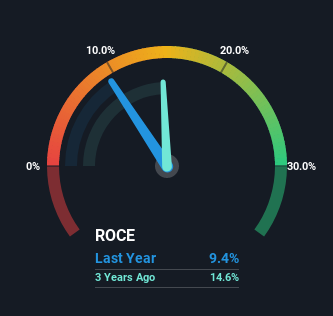- Hong Kong
- /
- Interactive Media and Services
- /
- SEHK:700
Tencent Holdings (HKG:700) May Have Issues Allocating Its Capital

Finding a business that has the potential to grow substantially is not easy, but it is possible if we look at a few key financial metrics. In a perfect world, we'd like to see a company investing more capital into its business and ideally the returns earned from that capital are also increasing. Ultimately, this demonstrates that it's a business that is reinvesting profits at increasing rates of return. In light of that, when we looked at Tencent Holdings (HKG:700) and its ROCE trend, we weren't exactly thrilled.
What Is Return On Capital Employed (ROCE)?
Just to clarify if you're unsure, ROCE is a metric for evaluating how much pre-tax income (in percentage terms) a company earns on the capital invested in its business. The formula for this calculation on Tencent Holdings is:
Return on Capital Employed = Earnings Before Interest and Tax (EBIT) ÷ (Total Assets - Current Liabilities)
0.094 = CN¥111b ÷ (CN¥1.5t - CN¥315b) (Based on the trailing twelve months to March 2022).
So, Tencent Holdings has an ROCE of 9.4%. On its own, that's a low figure but it's around the 8.1% average generated by the Interactive Media and Services industry.
View our latest analysis for Tencent Holdings

Above you can see how the current ROCE for Tencent Holdings compares to its prior returns on capital, but there's only so much you can tell from the past. If you'd like to see what analysts are forecasting going forward, you should check out our free report for Tencent Holdings.
So How Is Tencent Holdings' ROCE Trending?
On the surface, the trend of ROCE at Tencent Holdings doesn't inspire confidence. Around five years ago the returns on capital were 17%, but since then they've fallen to 9.4%. However, given capital employed and revenue have both increased it appears that the business is currently pursuing growth, at the consequence of short term returns. And if the increased capital generates additional returns, the business, and thus shareholders, will benefit in the long run.
The Bottom Line
In summary, despite lower returns in the short term, we're encouraged to see that Tencent Holdings is reinvesting for growth and has higher sales as a result. However, total returns to shareholders over the last five years have been flat, which could indicate these growth trends potentially aren't accounted for yet by investors. So we think it'd be worthwhile to look further into this stock given the trends look encouraging.
Like most companies, Tencent Holdings does come with some risks, and we've found 1 warning sign that you should be aware of.
If you want to search for solid companies with great earnings, check out this free list of companies with good balance sheets and impressive returns on equity.
Valuation is complex, but we're here to simplify it.
Discover if Tencent Holdings might be undervalued or overvalued with our detailed analysis, featuring fair value estimates, potential risks, dividends, insider trades, and its financial condition.
Access Free AnalysisHave feedback on this article? Concerned about the content? Get in touch with us directly. Alternatively, email editorial-team (at) simplywallst.com.
This article by Simply Wall St is general in nature. We provide commentary based on historical data and analyst forecasts only using an unbiased methodology and our articles are not intended to be financial advice. It does not constitute a recommendation to buy or sell any stock, and does not take account of your objectives, or your financial situation. We aim to bring you long-term focused analysis driven by fundamental data. Note that our analysis may not factor in the latest price-sensitive company announcements or qualitative material. Simply Wall St has no position in any stocks mentioned.
About SEHK:700
Tencent Holdings
An investment holding company, provides value-added services, marketing services, fintech, and business services in Mainland China and internationally.
Very undervalued with flawless balance sheet.
Similar Companies
Market Insights
Community Narratives



